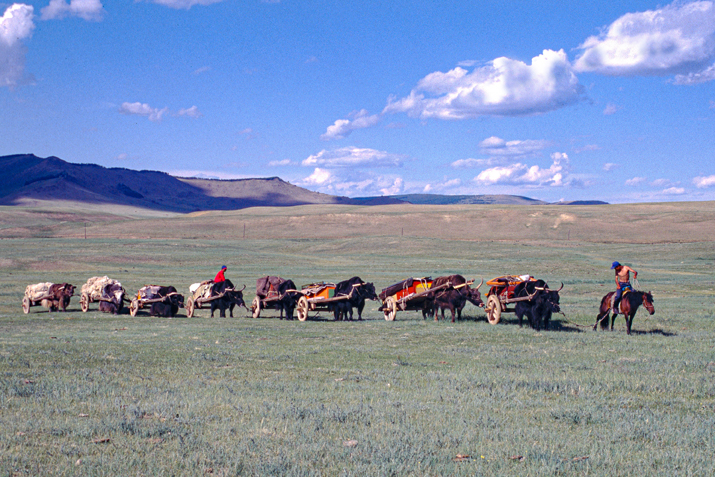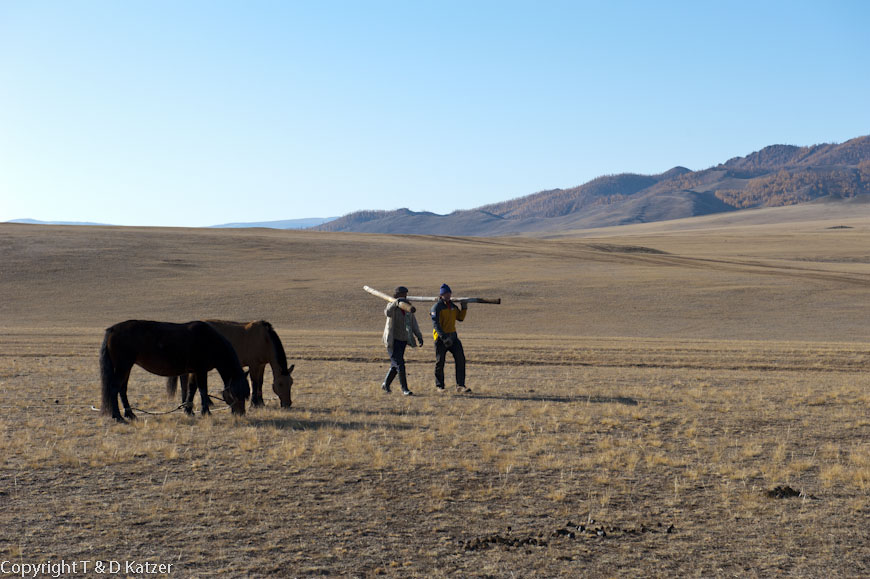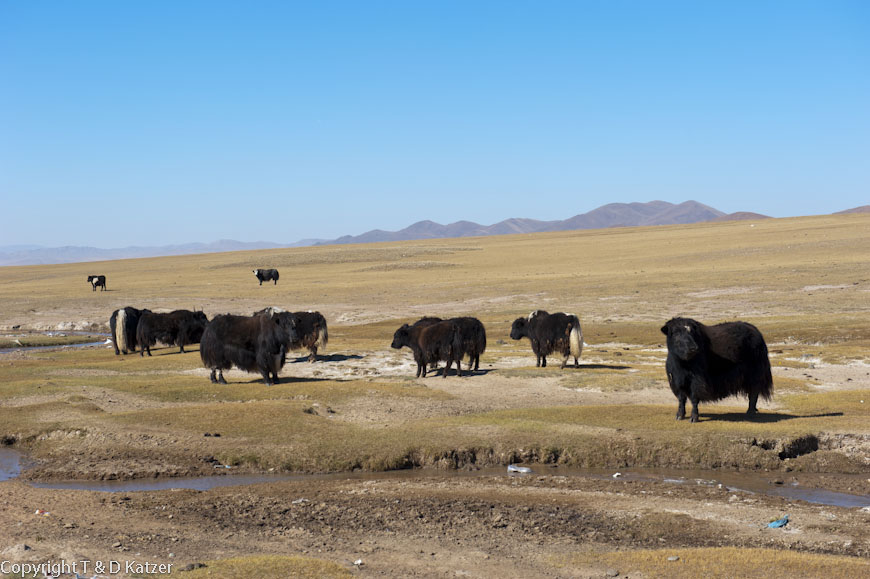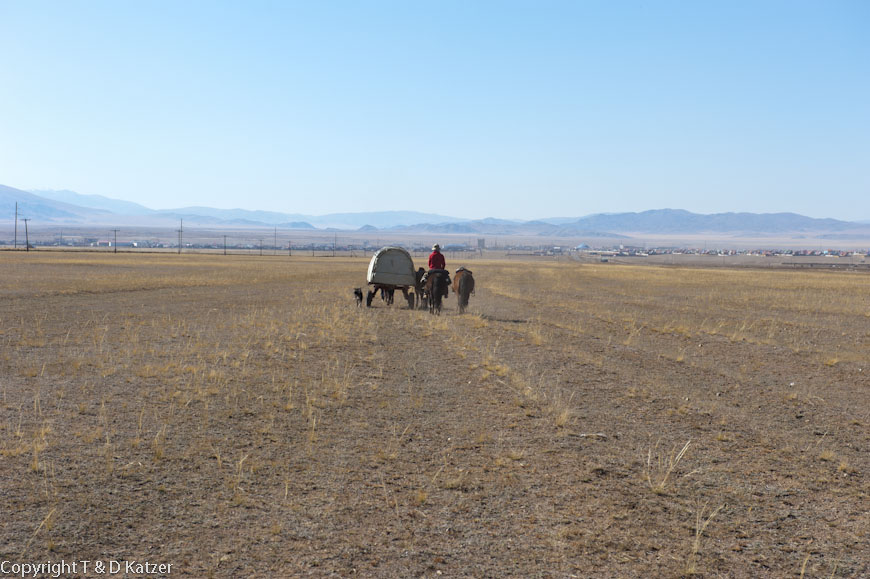
Reach our first stage destination
N 49°38'671'' E 100°11'496''
Day: 67
Sunrise:
07:15
Sunset:
19:04
As the crow flies:
8,96
Daily kilometers:
11
Total kilometers:
777
Soil condition:
Stones/gravel
Temperature – Day (maximum):
15°C
Temperature – day (minimum):
10°C
Temperature – Night:
minus 5°
Latitude:
49°38’671”
Longitude:
100°11’496”
Maximum height:
1220 m above sea level
Time of departure:
12:30
Arrival time:
15:00



We open our eyes at 7 a.m. and take a look outside. All the horses are still there. It was an uncomfortable night with very little and restless sleep. We wonder whether Ulzii really won’t be back today or whether he just had a bad moment yesterday? “He’ll at least demand his salary,” I say. “But he doesn’t have to come to camp for that. I think he’ll come and see us at Saraa,” Tanja replies. “Probably,” I reply, pulling the sleeping bag over my head again. At 8:00 a.m. we hear the zipper of Bilgee’s tent. We immediately crawl out of our little tent opening and greet him in a friendly manner. “Oglooniimend!” (Good morning), I shout. “Oglooniimend!” replies Bilgee in a good mood. We are relieved. It looks like Bilgee will stay with us for the time being. Although we didn’t think he would let us down either, we are reassured. Mongolia has surprised us many times so far, exactly when we didn’t expect it.
Bilgee immediately sets off to fetch the two old horse stakes he discovered on a hill yesterday. “I’m going with you!” I shout, put on another jacket and run after him. I would like to show him that I am willing to take over Ulzii’s tasks and that we can reach our goal without a translator. “It’s strange that Ulzii left us just before the finish,” I say in German and sign language as we puff up the mountain side by side. “Ulzii is behaving like an immature little boy. That’s not good,” I understand and see him raise the little finger of his clenched fist. Again, I am relieved that Bilgee has understood the situation and judges it like a grown-up, experienced man. On past trips we have also had translators who deliberately tried to gain an advantage by misrepresenting our words. It looks like Ulzii didn’t do that or Bilgee didn’t believe him. When we reach the horse posts on the hill, we try to pull the wooden stakes out of the ground. Only with great effort can we free the smaller of the two from the ground. “What are we going to do with the big pole?” I ask. Bilgee spits into his hands, ties a knot around the small stake and a knot around the large wooden stake still sitting in the ground and manages to heave it out with sheer leverage. Each carrying a pole on our shoulders, we march silently to the camp.
Once in camp, Bilgee starts sawing up one of the logs. “I discovered two more horse stakes on another hill. That will give us firewood for two days. Only the horses have hardly any food on the grazed meadow,” he reflects. Only now do Tanja and I realize that Bilgee wants to stay here for several days. But for the organizational work we have to do for the winter, it is impossible to camp out here. We have to go into town. We need permits to live in the Tsaatan nature reserve for a planned seven months. We need the political backing of the mayor of Mörön and, because we are up there not far from the Russian border, a special permit from the military. We need all the equipment for a yurt and have to discuss with Saraa how our equipment will get to the village of Tsagaan Nuur, 350 kilometers away from here. So far we have no idea where we can keep our horses in winter. If we want to bring our equipment from Mörön to the extremely remote region of our Mother Earth with four-wheel drive vehicles, this has to be organized. However, this means that the horses stay in Mörön or Bilgee rides them back to Erdenet. But who feeds them over this long period? How much does it cost? And can we trust the shepherds with whom we leave our mounts? The preparations we had in Erdenet pale into insignificance compared to what lies ahead. That is an inescapable fact. Tanja and I have set aside at least two weeks for this. And if we manage to do it during this time, a divine ray will hit us again. But how do we explain all this to our Bilgee? Impossible without a translator. Our Mongolian is a disaster so far. We are practicing but it is not easy to learn this language.
Tanja tries to reach Saraa on her cell phone but the line breaks down every time. Under these difficult conditions, I could curse Ulzii. But that doesn’t help now. To date, he has done a passable job with a few exceptions. He was the worst translator we ever had on our expeditions but now we realize how difficult it is without him. If Bilgee wasn’t so grown up and reacted in a considered and level-headed manner, the trip would be over for the time being. “Here, this is a friend of mine,” says Bilgee and hands Tanja his cell phone. Since he has a different cell phone provider, we get in touch via his phone. “The woman on the other end of the line can barely be understood because of the constant dropouts. Then the line on Bilgee’s phone breaks down too. We try to reach Saraa again. This time with success. “I can’t leave my house. I have two babies to look after at the moment. When you get to the edge of town, I’ll come and meet you. We’ll sort everything else out later,” she says, then the line cuts out again. “There’s no food for our horses in the city and water is expensive,” reflects Bilgee. “Yes, we know. But we still have to go in. Saraa thinks we can sort everything out on the spot,” I try to explain to our husband. He nods his head but doesn’t understand that Saraa can’t come to camp with us. “Saraa has two babies to look after,” explains Tanja, stretching out her right forearm, placing her left hand in the crook of her arm and moving her arm back and forth as if she were soothing a crying baby. She imitates the crying of a baby. “Ahh, ha, ha, ha,” Bilgee laughs understandingly now.
Before we pack up our camp, we boil hot water for a semolina porridge with raisins and tea on the firewood we have laboriously brought in. Then we help each other and hardly notice that we are missing a worker. “As always, it’s all “state of mind”, I say to myself repeatedly. A situation only has the power we attribute to it. It is only bad if we allow it to be. Every task is solvable and has its challenges that allow us to mature. Viewed with wisdom, and I must admit that I am far from it, one can be grateful for such a challenge. What would life be without ups and downs? It would be very boring in the long term. And what would life be without challenges? It would be a life without learning. I wouldn’t want a life without learning because learning is a great thing. It’s fun and always takes us one step further. Step by step, we are making progress. It’s wonderful to get ahead. Not only to put one foot in front of the other but also to put one thought conclusion after the other. This is how we build the framework of life. A scaffolding that may one day reach up to the sky. So much so that we can open another door that we have been walking towards for years. Behind this door there are new tasks, a new universe, another infinity. Even if such situations sometimes make me think and draw conclusions, they are not always nice in the moment in which I live them. It would be fantastic if you could manage to accept them at the moment they happen and take them in stride. Then life is no longer difficult but a constantly changing dream.
At 12:30 p.m. we leave the campsite behind us. Slowly we ride towards Mörön, this time just the three of us. We use one of the countless lanes that the cars have pulled into the steppe. As the tires work their way deep into the turf when it rains, the drivers leave the rutted track to find a new, better surface. As a result, one rutted track often follows another across the width of an entire valley. This can only be disastrous for the environment. The soil becomes compacted, which changes the vegetation. Some of the channels are washed out by heavy rainfall to such an extent that the entire soil layers are washed away several meters deep. The erosion damage is fatal. Nothing will grow here for decades. It is difficult to cross the endless bumps with the horse-drawn carts. There is not a single meter in this valley without such a wave pulled by car tires.
After two hours we reach the village sign of Mörön. “We’re at the entrance to the village now,” says Tanja, holding her cell phone to her ear and riding her horse. “I’ll pick you up,” Saraa replies. Ten minutes later, an old car comes towards us. A middle-aged woman gets out. “Is that Saraa?” I ask. “I think so,” says Tanja. The woman is talking to Bilgee. We assume she is explaining the way into town. As she hasn’t greeted us yet, we still don’t know whether she really is Saraa. “Saraa?” I ask, a little unsettled. “Yes,” she replies. Now that we’ve met for the first time in over a year, I’m a little unsettled by the reserved greeting. “Is that because of Ulzii?” I wonder. I get off my horse, walk towards her and hug her. After all, we have her to thank for being here at all. Saraa returns the hug and laughs now. “Bilgee knows where we live. I explained the way to him. Just follow him. We’ll meet at my house,” she explains and gets back into the dilapidated car. The hooves of our horses stir up the dust. To the left and right of the dirt track are rows of typical wooden fences behind which the log and wooden huts are located. Suddenly a man gets out of the car, runs towards us and takes Ulyti’s horse from Tanja’s hand. “That’s my horse!” she shouts, holding the lead tightly. “I’m Ulzii’s brother, Saraa’s husband,” he explains with a laugh. “I see,” Tanja replies and gives him the reins. He gallops ahead happily and shows us the way. He bridles his horse in front of a metal entrance and gets out of the saddle. He enthusiastically opens the gate and tells us to lead our horses and carts into the small, dusty courtyard of about 400 square meters. “Should we leave our animals here during the preparation?” wonders Tanja. ‘I hope not,’ I reply, because we can only put them up here for a day at most. Since Saraa has suggested that we build a yurt for us to live in, we are surprised not to see any in the courtyard. “Maybe the yurt is in a different place and we’re just staying here for a cup of tea,” I think. “Come into the house,” Saraa asks us. We unhitch Bor, put the horse-drawn cart on its peg and tie our horses to the wooden fence. Then we unload the saddlebags and enter the small log cabin. A little confused to find ourselves in a house again for many weeks, we sit down on a wooden chair and wait to see what will happen. Sara’s husband pours us a cup of milk tea and offers us white bread and cookies. “Oh God, just no cookies”, it goes through my head as I’m cured of all the sweet stuff for the time being. I sip the traditional milk tea, cautiously take a slice of white bread and let my gaze glide through the interior of the dwelling. Bilgee, Tanja, Saraa’s husband Gonchigdorj, Saraa, who is currently breastfeeding her two-month-old baby Erkhenbayar, her four-year-old son Ontsgoibayar, her 15-year-old son Batzorig and I are sitting or standing in the small kitchen of about 5 square meters. No longer used to the confines of a fully occupied room, I immediately long to be in one of our camps. The small cannon stove, which is also used for cooking, radiates pleasant warmth. Apart from a shelf with a few plates and cups on it and a small fridge, there is nothing in the kitchen. A doorway without a door leads into an even smaller bedroom. A bed, a chest painted in Mongolian style and a kind of baby cot furnish the spartan room. Another doorway without a door leads into the living room, which is about 17 square meters in size and has hardly any furnishings apart from a television. As a rule, the family sleeps on the carpet here. “Are you hungry?” asks Saraa. “Riders are always hungry,” I reply with a laugh. Half an hour later, each of us gets a bowl of rice and meat. As a relaxed vegetarian, Tanja fishes the pieces of meat out of her bowl and gives them to me. “We should water the horses,” suggests Bilgee, who is always concerned about our animals. “Good idea,” we reply and head back into the dusty courtyard. We untie the horses and take them to the water distribution point in this part of town. Thirsty, each animal drinks 20 liters of the delicious liquid. We pay 400 Tugrik (25,- Eurocent) and lead our mounts back to Saraas yard. It turns out that we are allowed to sleep in Saraa’s house tonight. The yurt will be bought and set up tomorrow. Saraa asks her friends, acquaintances and neighbors for the urgently needed animal food. “We’ll get hay from somewhere,” she says confidently. In the evening, she actually finds what she is looking for. The neighbor across the street has cut two bales of hay that we can take. Bilgee and I happily carry the bales to our animals and throw a pile in front of each of them. They immediately begin to satisfy their hunger. “It’s not the best quality, but it’s better than nothing,” says Bilgee with satisfaction. “How much does the hay cost?” I ask Saraa. “Oh, I don’t know. Give me what you think”, is also her typical answer, which we have heard several times during our preparation. “I don’t know what to give. I don’t want to pay too little or too much. What do you think is a reasonable price?” I ask. “10,000 tugrik (€5.71) is certainly reasonable. The man worked long hours with his sickle to cut the hay,” her answer startles me a little, as 6,233 tugrik (€3.57) is the average daily income. “How long will the horses eat it?” I ask Bilgee. “They’ll need hay again in the morning,” he says. “Then only the hay costs us a lot of money,” says Tanja. “Hm, we’ll have to think of something else. Let’s talk about it tomorrow,” I say, walking back into Sara’s house, dog-tired. “Can you please give me 20,000 tugrik (€11.42). I’m going shopping for vegetables for dinner,” Saraa asks me. “Gladly,” I say and hand her the money. “The city is expensive,” says Tanja. “Yes, life doesn’t cost much out on the steppe. But we have no other choice. We have to prepare everything else here,” I reply. “What about horse theft in the city? Do we have to put in guard shifts?” I ask Saraa. “Because our door can’t be locked, it would make sense,” she says. “Oh no. Not another night shift. I want to sleep through the night for once. Bilgee and I will think of a way to lock the gate tonight,” I reply. After we have unloaded the entire horse-drawn wagon and put everything into the small log cabin, Bilgee and I stand in front of the gate and think about how to close it. It doesn’t take long and we find a solution. A metal handle from my spare parts store is quickly screwed onto the door, through which we pull two chains and a Chinese lock. “Looks good,” says Bilgee with a laugh. We shake hands and go back into the house. Saraa has now also returned from shopping. There are small balls of dough filled with sheep meat that are cooked in milk but unfortunately no vegetables. Even though the dough balls only cost a few thousand tugrik, we don’t want to ask what happened to the vegetables. We do not want to jeopardize hospitality. Tanja is content to eat only the dough of these balls.
To celebrate, we bought some beer and peanuts in a small grocery store not far from here. We buy everyone a beer and are delighted to have made it this far. It’s a shame that Ulzii doesn’t get to see this moment. It is a sublime moment to have reached Sara’s home after all the preparations, the initial visa problems, the eternal negotiations, the horse purchases, the horse-drawn carriage construction, running away from Ulzii’s uncle Tsagaan, the many passports, the onset of winter and much more. 400 kilometers full of adventures and experiences. We don’t snuggle into our sleeping bags until after midnight. The wood in the small cannon stove next to us crackles and warms us. For the first time, the tips of their noses and faces are not cold. Bilgee, Tanja and I spend a wonderful night without a break in the waking shift.
We look forward to your comments!

